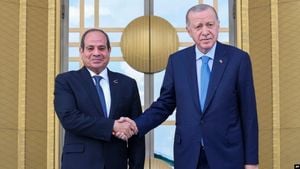Krzysztof Bosak, the Deputy Marshal of the Polish Sejm, recently held significant discussions with Hungarian Foreign Minister Péter Szijjártó amid rising political tensions and legal concerns surrounding opposition politicians. The meeting took place on February 4, 2025, during Szijjártó's visit to Warsaw, where he addressed various issues impacting both nations.
During this informal encounter, which Bosak shared on social media, Szijjártó remarked on the troubling developments occurring within Poland, stating, "W Polsce dzieją się skandaliczne rzeczy" ("Scandalous things are happening in Poland"). His comments cited the arrest of opposition members, alleged political purges within the judiciary, and irregular actions taken against the public prosecutor. He indicated the precarious nature of political stability as he described the current conditions over the political climate and expressed solidarity with the opposition's growing influence.
Szijjártó's remarks stirred reactions, particularly from Radosław Sikorski, Poland's Foreign Minister, who hoped Bosak would discuss legal matters related to Marcin Romanowski. Romanowski, facing severe legal allegations linked to the so-called Justice Fund, fled to Hungary to escape the ramifications of his actions as authorities sought his detention through mutual European arrest warrants. Sikorski pointedly expressed, "I hope Mr. Bosak reminded the Hungarian Minister about the implementation of the European Arrest Warrant against the fugitive MP suspected of serious financial crimes."
Responding to Sikorski's hopes, Bosak maintained his stance by stating, "To rola członków rządu" ("It is the role of government members"), indicating he was not inclined to infringe upon their responsibilities or engage deeply with the legal discourse surrounding Romanowski. His comment highlighted the division of responsibilities among governmental officials amid increasing scrutiny of political processes.
Despite the tensions, Szijjártó praised the political alignment between Hungary and the Konfederacja, the right-wing faction led by Bosak. He noted the growing support for the National Movement associated with the Konfederacja and declared, "It is no wonder the Polish opposition is gaining strength..." indicating positive potential for the collaboration against migration and for the preservation of both nations' sovereignty and values.
The meeting served not only to reinforce collaboration between Hungary and the Konfederacja but also underlined the significance of shared political values among like-minded parties. Szijjártó’s observations of the political climate served as both encouragement and warning to Polish leaders; his sentiments emphasized the need for unity and vigilance against perceived injustices, as echoed by Bosak’s affirmations of the historical bonds between Poland and Hungary.
Throughout their conversations, Bosak and Szijjártó reiterated the necessity of independence for their nations, illustrating the mutual respect between their political ideologies. They reflected on the past and engaged with contemporary challenges, aligning their parties' goals and advocating for traditional values, freedom, and family preservation. The meeting underscored the delicate balance of diplomacy, as regional powers navigate contentious domestic landscapes and seek collaborative paths forward.
These discussions between Bosak and Szijjártó exemplify the complex interplay of politics, law, and regional solidarity within Central Europe, where historical ties often dictate current alliances. The ramifications of their meeting extend beyond their immediate agenda, influencing perceptions within both countries as they face inevitable political challenges.
With the opposition's rising tide and mounting legal challenges faced by key figures, including Romanowski, the consequences of this meeting could very well shape future legislative and diplomatic activities between Poland and Hungary, as both navigate the trials of their respective political climates.



